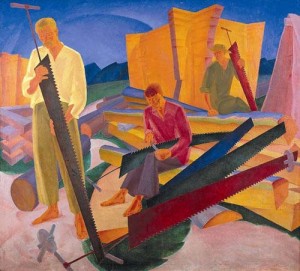
走了,走了
电锯在院子里呜呜噜噜卡卡嗒嗒地叫着。
尘土飞扬中落下炉膛长度的木头,
和风拂过飘出阵阵甜香。
如果你有心举目,
可以看到五座大山相连,
在夕阳下深入到远方的弗蒙特州。
电锯呜噜卡嗒,呜噜卡嗒,
空转卡嗒,触木呜噜。
没什么事情发生,日子好像就要这样结束了。
就是这么一天,我琢磨着他们可能说过
让那个男孩子休息一会儿,
这样他就不用整天想着怎么赶工,
省下半小时的时间。
他的姐姐穿着围裙在他身边坐下,
告诉他“吃晚饭”。话音刚落,
那电锯,好像知道“晚饭”是个啥意思,
跳到了男孩的手上,或者看起来跳了——
他肯定送上了自己的手。无论如何,
手和电锯都没拒绝对方。但是手!
男孩的第一声叫是懊丧的笑声,
他摆身转向它们捡起了那只手,
一半是被它吸引,另一半是好像想让它停止泄出阳气。
然后这个男孩看到了一切——
他已经足够成熟可以看到,大男孩做着男人的工作,
虽然心中还是一个小孩儿——
他看到一切都搞砸了。“不要让他们切掉我的手,
那个医生,他来的时候,不要让他切我的手,姐!”
但是呢,手已经离他而去。
医生用乙醚让他进入黑暗,
他躺着吹出了最后一口气。
然后监控他脉博的人着慌了,
但没人相信。他们听他的心脏,
弱-更弱-没了!就这么结束了。
现在做啥也于事无补。然后,既然他们
不是死的那个,又转身去做他们自己的事情了。
作者 / [美国] 罗伯特·弗罗斯特
翻译 / 光诸
Out,Out--
The buzz-saw snarled and rattled in the yard
And made dust and dropped stove-length sticks of wood,
Sweet-scented stuff when the breeze drew across it.
And from there those that lifted eyes could count
Five mountain ranges one behind the other
Under the sunset far into Vermont.
And the saw snarled and rattled, snarled and rattled,
As it ran light, or had to bear a load.
And nothing happened: day was all but done.
Call it a day, I wish they might have said
To please the boy by giving him the half hour
That a boy counts so much when saved from work.
His sister stood beside them in her apron
To tell them "Supper." At the word, the saw,
As if to prove saws knew what supper meant,
Leaped out at the boy's hand, or seemed to leap—
He must have given the hand. However it was,
Neither refused the meeting. But the hand!
The boy's first outcry was a rueful laugh,
As he swung toward them holding up the hand
Half in appeal, but half as if to keep
The life from spilling. Then the boy saw all—
Since he was old enough to know, big boy
Doing a man's work, though a child at heart—
He saw all spoiled. "Don't let him cut my hand off—
The doctor, when he comes. Don't let him, sister!"
So. But the hand was gone already.
The doctor put him in the dark of ether.
He lay and puffed his lips out with his breath.
And then—the watcher at his pulse took fright.
No one believed. They listened at his heart.
Little—less—nothing!—and that ended it.
No more to build on there. And they, since they
Were not the one dead, turned to their affairs.
Robert Frost
这几天因为众所周知的原因,我们的社会貌似进入了一个严肃的区间,所以今天不发小黄诗、奇葩诗,来一首特别严肃的。
在外语教学与研究出版社引进汤姆森学习出版集团版权的《理解诗歌》(Understanding Poetry)一书中,《走了,走了》是第一章最先出现的一首诗,给人留下极深的印象。本诗的作者罗伯特·弗罗斯特作为有史以来最具影响力的诗人之一,其重要性不需过多介绍,但是多数人知道这位大师还是因为他的那首《雪夜林畔小驻》(Stopping by Woods on a Snowy Evening),以为他写的都是这种乡村题材的“小清新”、“傻白甜”的诗。如果真是这样,弗罗斯特绝对不会有今天这样的声誉。
《走了,走了》这首诗就说明弗罗斯特是一位非常“狠”的诗人。它描述了一位锯木少年不慎被电锯切掉了手,又因为医疗事故而糊里糊涂地丧生的故事。如果写成新闻标题,恐怕是这样的:“新英格兰一少年遭电锯断手丧生”。在新闻中,我们只关于事物的前因后果,而很少关心其中的细节。但是《走了,走了》却描写了前后的大量细节,其中包括在事故发生之前田园牧歌一样的劳动场面,电锯的“致命一跳”,以及在断手之后众人清冷的反应。它让我们可以“进入”不幸事件。但和很多为了实现“浸入感”而极力煽情的写法不同,《走了,走了》的写法极其客观,结尾那句“然后,既然他们不是死的那个,又转身去做他们自己的事情了”更是让人大出意料,因为它甚至比新闻稿还决绝地否定了“浸入”的可能。这种丰富的细节和冷酷的描写之间的对比给了这首诗两层不同的纹理:第一,它还原了人类的一种真实的感受:他人的苦难是我们无法“进入”的;第二,它引发了我们的思考:我们对于苦难的感受,是否缺失了什么东西,让这种苦难有更多的机会在我们的社会中肆虐?
对于一个在历史上和新闻中都会看到太多苦难的社会,《走了,走了》是一首必读的诗。
荐诗 / 光诸
2015/08/31
题图 / Tuning saws, Oleksandr Bogomazov, 1927
Published 2015/08/31
Last updated: 2015/09/03

近期评论